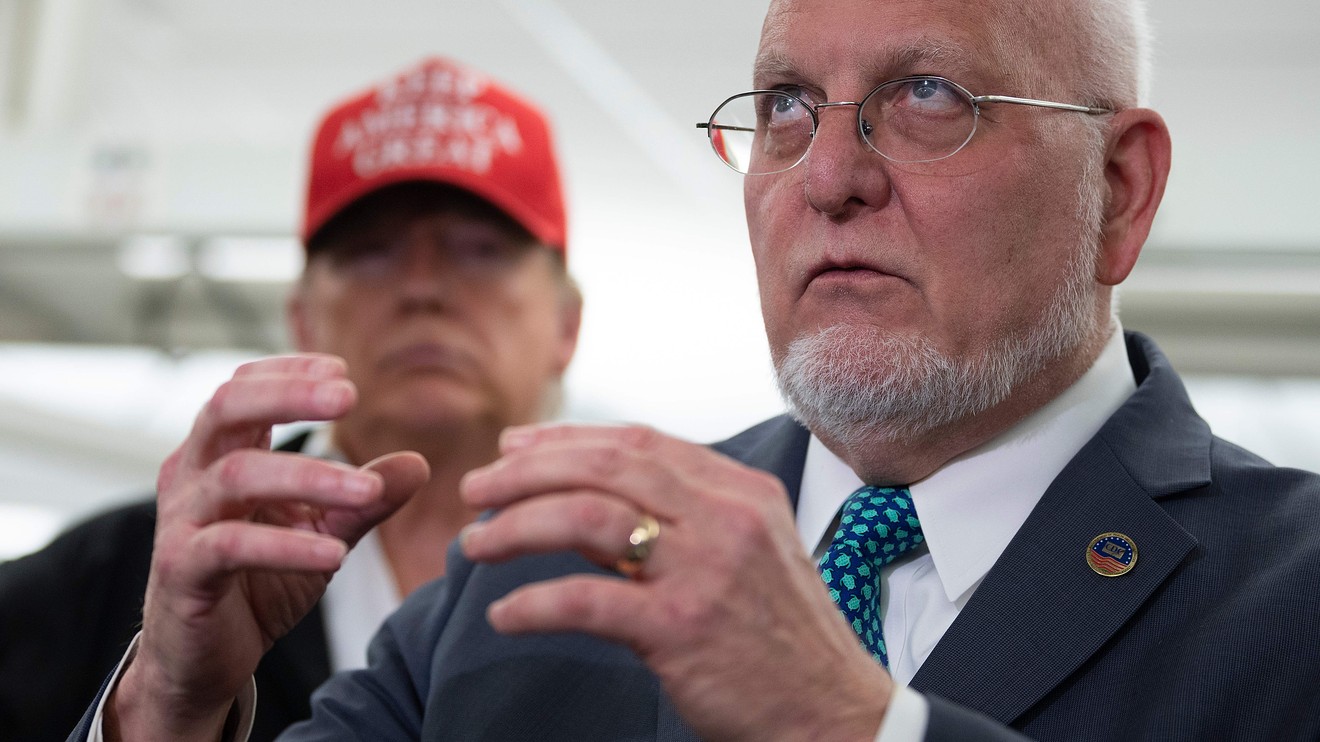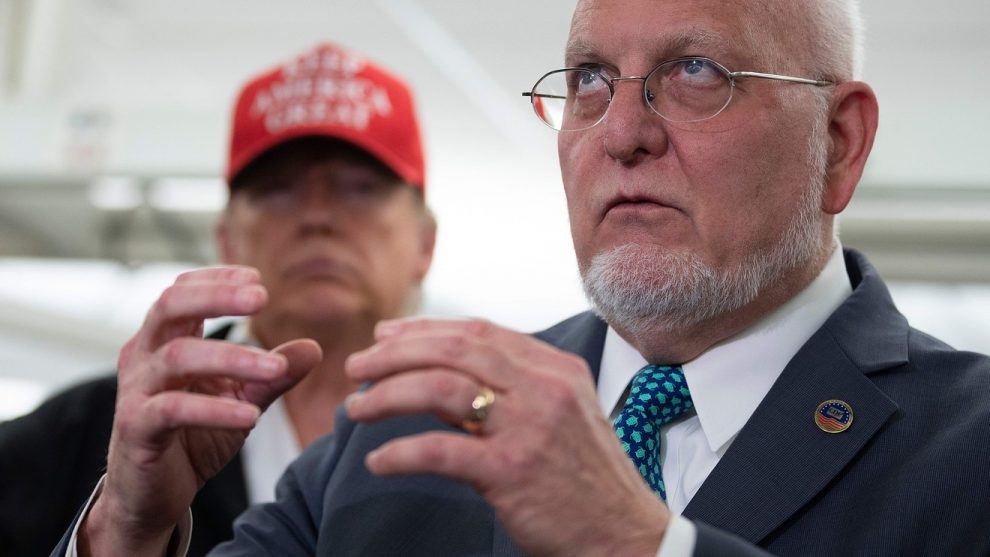
The U.S. death toll from the coronavirus that causes COVID-19 edged closer to 100,000 on Friday, as the news emerged that the Centers for Disease Control and Prevention has been combining the results of two different types of tests for the illness in a move that has been sharply criticized by health experts.
The CDC has been combining diagnostic test results, which show whether a patient currently has the virus, with antibody test results that measure whether someone has ever had the virus, the Atlantic magazine reported. The CDC confirmed the report to MarketWatch.
“This is not merely a technical error,” the Atlantic wrote. “States have set quantitative guidelines for reopening their economies based on these flawed data points.”
The story cited Ashish Jha, the K. T. Li Professor of Global Health at Harvard and the director of the Harvard Global Health Institute, as saying the two tests provide totally different signals. By combining them, the agency has made both sets of results “uninterpretable.”
“How could the CDC make that mistake?” he asked. “This is a mess.”
The news comes as all 50 states start to reopen for business following lockdowns and other restrictions on movement, with most following CDC guidelines that are based on carefully monitoring data points based on testing. Americans are expected to move more freely over the coming long Memorial Day holiday weekend that signals the start of summer.
It also comes as an ABC News/Ispos poll found that just 39% of Americans approve of President Donald Trump’s handling of the crisis, the lowest reading for the president since the poll started to track sentiment in March.
A Fox News poll published on Thursday found just 44% of those polled approve of Trump’s performance, down from 49% in April. The same poll found 74% approved of Dr. Anthony Fauci’s handling of the pandemic, the nation’s leading infectious disease expert, and 70% approved of the actions of state governments. A full 88% of those surveyed said they were concerned about the spread of the virus.
See also: The U.S. is in ‘relative decline’ as ‘Chinese power is rapidly rising,’ warns Ray Dalio
Trump was busy on Twitter Friday, lashing out at Michigan Attorney General Dana Nessel after she called him a “petulant child” for refusing to wear a face mask at all times, while touring a Ford Motor Co. F, -0.97% plant that has switched production to make ventilators and masks. Trump spoke to reporters without a mask, while saying and being photographed wearing one for part of the tour.
Latest tallies
There are now 5.13 million cases of COVID-19 worldwide and at least 333,489 people have died, according to data aggregated by Johns Hopkins University. At least 1.9 million people have recovered.
The big overnight move was in India, which suffered its biggest case increase in a 24-hour period since the start of the outbreak with 6,000 new cases confirmed. That brings its case tally to 119,419. At least 3,599 Indians have died.
The U.S. has the highest case toll in the world at 1.58 million and the highest death toll at 94,729.
Russia has 326,448 cases and 3,249 deaths. Brazil has 310,087 cases and 20,047 deaths.
The U.K. has 252,246 cases and 36,124 deaths, the highest death toll in Europe and second highest in the world after the U.S.
Spain has 233,037 cases and 27,940 deaths, while Italy has 228,006 cases and 32,486 deaths.
France has 181,951 cases and 28,218 deaths, while Germany has 179,150 cases and 8,219 deaths.
Turkey has 153,548 cases and 4,249 deaths and Iran has 131,652 cases and 7,300 deaths. Peru has 108,769 cases and 3,148 deaths.
China, where the disease was first reported late last year, has 84,081 cases and 4,638 deaths.
New York remains the U.S. epicenter with 361,313 cases and 28,663 deaths, according to a New York Times tracker.
What are companies saying?
Earnings season proved a mixed bag for some big tech names on Thursday with Nvidia Corp. NVDA, +2.55% posting consensus-beating profit and sales as data-center sales topped $1 billion for the first time. The chip giant’s two largest segments, chips for gaming and chips for data centers, showed no signs of damage from the pandemic, after emerging from a year of struggle at the end of 2019. Data-center operators continue to push new chips into their servers to increase machine-learning capabilities for cloud customers and their own usage, while videogames have enjoyed a strong surge amid shelter-in-place requirements.
Read:Business in the Age of COVID-19: Nvidia should dodge massive coronavirus effects
Related:It’s official: Nvidia is not just a gaming company anymore
There was less cheery news for Hewlett Packard Enterprise Co. HPE, -11.39%, which posted numbers that fell far short of estimates thanks to supply chain constraints.
“The global economic lockdowns since February significantly impacted our fiscal Q2 financial performance,” HPE Chief Executive Antonio Neri said in a statement announcing the results. “We exited Q2 with $1.5 billion in orders across the portfolio, representing two times the average historical backlog.”
The company is exploring furloughs, layoffs and other measures with the aim of shaving $1 billion off future costs. A.B. Bernstein analyst Toni Sacconaghi, echoing the concerns of other analysts on the conference call, expressed wariness over what he called another “significant multi-year effort” by HPE to slash costs. Neri characterized this quarter as a supply issue because of coronavirus vs. a dip in IT demand last year.
Read also: Palo Alto Networks stock surges as earnings, outlook boosted by work-from-home
Friday brought numbers from agriculture and construction equipment maker Deere & Co. DE, +1.05% , sporting retailer Foot Locker Inc. FL, -12.77% and Chinese e-commerce giant Alibaba Holdings Inc. BABA, -5.20% , which offered a first look at how China is faring as it comes out of lockdown.
Elsewhere, companies continued to issue debt and equity, and to update investors and customers on their reopening plans.
Here are the latest things companies have said about COVID-19:
• Agilent Technologies Inc. A, +4.79% topped earnings and revenue expectations in its latest quarter. Chief Executive Mike McMullen said the company is well-positioned to “face the challenges” of the pandemic and was poised to focus on “growth, a resilient business model, and strong balance sheet.”
• Alibaba has seen a “steady recovery since March” after the COVID-19 outbreak dampened its business earlier in the year. The company’s profit and revenue topped analyst estimates. The number of annual average customers on its China retail marketplaces hit 726 million in the quarter, up 15 million from the 12-month period that ended in December. For the full fiscal year, which ended in March, Alibaba saw RMB7.1 trillion ($995 trillion) in gross merchandise volume across its “digital economy.” For the new fiscal year, the company expects over RMB650 billion in revenue, while analysts were modeling RMB659 billion.
• Bed Bath & Beyond Inc. BBBY, -1.94% plans to reopen 600 stores, including 500 across North America, and bring back about 11,000 furloughed workers by June 13. In addition to 500 Bed Bath & Beyond locations in the U.S. and Canada, about 50 Christmas Tree Shops and 50 Cost Plus World Market stores will begin operating. As of February 2020, the company had 1,500 stores, and 55,000 workers, according to FactSet. Bed Bath & Beyond is expanding contactless curbside pickup services to 1,350 stores total, adding 600. Traffic to the Bed Bath & Beyond website and mobile app is up more than 30% over recent weeks and digital sales have doubled, according to a statement from CEO Mark Tritton. The retailer’s safety plan includes enhanced sanitation, protective gear for workers and limiting the number of people allowed in stores at one time.
• Cleveland-Cliffs Inc.; s CLF, -2.86% AK Steel subsidiary is increasing spot market base prices for all carbon flat-rolled steel products by a minimum of $40 per ton, effective immediately. That suggests prices are rising by at least 4%, as the iron ore mining company said the average net selling price per net ton of flat-rolled steel during the first quarter was $997.
• Deere reported fiscal second-quarter profit and revenue that fell amid business disruptions related to the pandemic, but beat expectations. Agriculture and turf revenue declined 18% to $5.97 billion, matching the FactSet consensus, while construction and forestry revenue fell 25% to $2.26 billion but beat expectations of $2.10 billion. The company expects full-year net income of $1.6 billion to $2.0 billion, compared with the FactSet consensus of $2.04 billion.
• E.L.F. Beauty Inc. ELF, +15.52% beat Wall Street expectations for its fiscal fourth-quarter sales and adjusted profit. A sales increase was mostly thanks to “increased productivity across our retail and e-commerce channels, partially offset by the closing of all 22 E.L.F. retail stores in February 2019” due to the pandemic. The company has seen “significant decline in retail sales due to the impact of the COVID-19 pandemic on consumer behavior,” with sales expected to be negatively impacted until consumers return to normal shopping patterns.” E.L.F. suspended fiscal 2021 guidance, and drew $20 million of its $50 million revolving credit facility, giving it about $65 million in cash on hand.
• Foot Locker reported a wider-than-expected fiscal first-quarter loss as revenue fell and the gross margin rate dropped as the pandemic led to store closures. The company suspended its quarterly dividend–the last dividend paid was 40 cents a share–”to preserve financial flexibility.”. The gross margin rate declined to 23.0% from 33.2%, while the expense rate increased to 26.9% from 20.0%. Merchandise inventory increased 20.4% to $1.46 billion. The company said the phased reopening of its stores is underway.
• Ross Stores Inc. ROST, -3.86% reported a surprise first-quarter loss and sales that were below Wall Street expectations. Since most of its stores were open for less than seven weeks of the 13-week period, the company did not report same-store sales. The company began reopening some stores last week depending on location, and about 700 stores have reopened since. “We have a deep bench of proven and experienced leaders throughout the business as well as a very strong financial foundation with over $3.0 billion in liquidity, which in addition to our cash balances includes a new $500 million revolving credit facility,” Chief Executive Barbara Rentler said.
• Under Armour Inc. UA, -3.24% UAA, -3.16% upsized and priced a $440 million offering of senior convertible notes that mature in 2024. The athletic apparel maker originally planned to raise $400 million in the deal. The notes are being sold in a private offering and priced at an interest rate of 1.5% a year. The notes can be settled in shares of class C common stock, cash or a combination of the two, at Under Armour’s discretion. Proceeds will be used to cover the cost of capped call transaction that will minimize the dilutive impact of conversion, and to repay debt.












